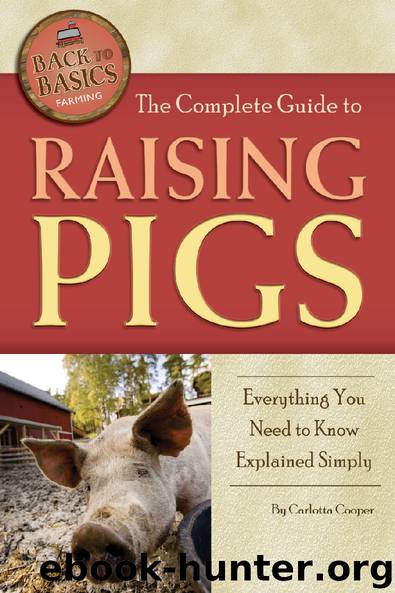The Complete Guide to Raising Pigs: Everything You Need to Know Explained Simply by Carlotta Cooper

Author:Carlotta Cooper
Language: eng
Format: epub
Tags: pigs, raising, raise, breed, meat, pets, butchering, processing, showing, feeding, care
Publisher: Atlantic Publishing
Published: 2012-03-09T00:00:00+00:00
Regional Considerations
Where you live will help you make some of your housing and other decisions. The Midwest has long been the hog capital of the United States and that remains true today. Most large commercial pork producers are located in this area. As a result, even small farmers in the Midwest will benefit from some of the breeds and services available in this region that may not be readily available elsewhere.
In terms of housing, you will need to consider the weather where you live. If you live in the South or Southwest, shade and the ability to keep you pigs cool during the summer will be very important considerations. In some southern states, it is not unusual for farmers to turn on misters or sprinklers so their pigs can cool down when it is hot. In northern areas, you will have to pay special attention to winter temperatures and the possibility of providing extra heat for some breeds of pigs, especially during and after farrowing. If you live in the Pacific Northwest, you will have to find ways to cope with raising pigs in a damp climate.
Different areas may also have different approaches to manure disposal, pig waste in the ground water, and parasite and disease control. You should talk to your county extension services agent to find out the recommended procedures in your area. If you intend to pasture raise your pigs, you will probably want to find out what kind of grasses and crops grow best in your area, in case you plan to plant them for your pigs. Again, your county extension services agent can assist you with information about grasses and crops. The county extension service can also perform a soil analysis to find out the composition of your soil. Knowing what is in your soil will also help you know what nutrients your pigs are getting when they graze on it.
It will help you to talk to some of your local pig raisers before you get started so you can find out how farmers in your area handle issues in your region. You can also talk to your county extension services agent about regional matters relating to growing pigs. He or she can provide you with a wealth of information about the soil in your area, crops, pig raising, pig housing, and other materials you will need. Your veterinarian is another great resource. He or she can answer questions for you about disease and parasite control in your area and what vaccinations will be most useful to your pigs.
Download
This site does not store any files on its server. We only index and link to content provided by other sites. Please contact the content providers to delete copyright contents if any and email us, we'll remove relevant links or contents immediately.
Craft Beer for the Homebrewer by Michael Agnew(18237)
Marijuana Grower's Handbook by Ed Rosenthal(3678)
Barkskins by Annie Proulx(3368)
Project Animal Farm: An Accidental Journey into the Secret World of Farming and the Truth About Our Food by Sonia Faruqi(3218)
Red Famine: Stalin's War on Ukraine by Anne Applebaum(2930)
The Plant Messiah by Carlos Magdalena(2927)
0041152001443424520 .pdf by Unknown(2844)
Organic Mushroom Farming and Mycoremediation by Tradd Cotter(2689)
In the Woods by Tana French(2591)
Beer is proof God loves us by Charles W. Bamforth(2455)
7-14 Days by Noah Waters(2412)
Between Two Fires by Christopher Buehlman(2325)
Borders by unknow(2304)
Reservoir 13 by Jon McGregor(2300)
Meathooked by Marta Zaraska(2257)
The Art of Making Gelato by Morgan Morano(2254)
Birds, Beasts and Relatives by Gerald Durrell(2218)
The 7 Habits of Highly Effective People: Powerful Lessons in Personal Change (25th Anniversary Edition) by Covey Stephen R(2197)
The Lean Farm Guide to Growing Vegetables: More In-Depth Lean Techniques for Efficient Organic Production by Ben Hartman(2135)
